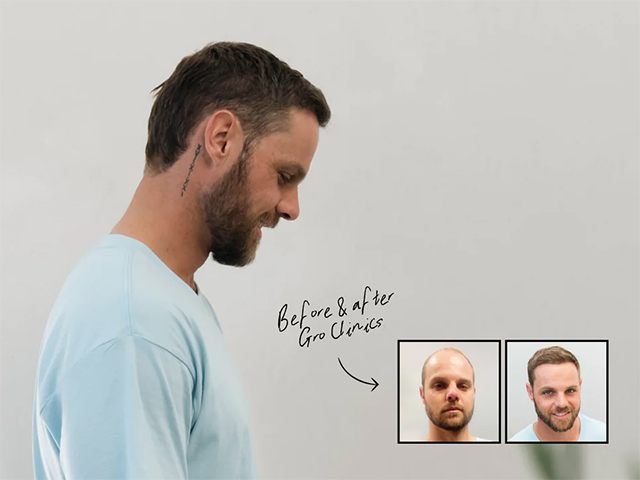How to Talk to Your Partner About Hair Loss

If someone you love is gradually thinning, developing noticeable bald patches, or experiencing severe hair loss, it can be a very sensitive topic for them.
That said, when approached with empathy and care, it is perfectly possible to have an open conversation about it without it hitting a raw nerve.
In this guide, we'll walk you through how to raise the subject of hair loss to your partner without hurting their feelings, making them feel self-conscious, or triggering insecurities.
We'll also explore why it's important to approach it with patience and understanding, and how you can offer genuine support without being too insensitive.
Hair Restoration Solutions
Before we highlight how to talk to your partner about hair loss, it's worth pointing out a good solution.
If your partner is open to exploring treatment options, you might want to introduce them to reputable professionals like GRO Clinics.
Companies like theirs specialise in advanced, natural-looking hair restoration services and provide free consultations for anyone considering their options.
It would be good for your partner to know about them, without feeling like they are being put under pressure.
How to talk to your partner
Now that you are aware of a good solution, here are six ways you can talk to your partner about their hair loss issues.
1. Pick the Right Time and Place
When it comes to sensitive subjects, timing is everything. So, don't bring it up when they're already stressed, or in the middle of enjoying a nice night out.
Instead, choose a quiet, private moment when you're both relaxed to raise the subject. This could be when you are going for a walk, having a cuppa, or lounging at home on a weekend.
It's important to note that it's not just about what you say, but also when and where you say it. It makes sense that the more comfortable they feel, the more open they'll be to chatting about something that could be affecting their confidence, so pick your moment wisely.
2. Start With Empathy
A common mistake many people make is to jump straight to fixes, without giving their partner a chance to process how they actually feel about their hair loss.
In other words, instead of saying "Why don't you try this product?" or "Have you seen this treatment?", begin with a simple empathetic question of "How do you feel about your hair?".
Doing this will demonstrate that you care, without putting pressure on them to respond in a certain way.
3. Avoid Judgement, Teasing or Jokes
Even if you've always joked around about each other's quirks or flaws, tread lightly when it comes to hair loss. What might sound like a harmless comment to you could be hitting a nerve for them, especially if they're already feeling sensitive about other insecurities.
It is not a good idea to use derogatory terms like "baldie" or "slaphead" unless your partner uses them first.
Additionally, stick to language that feels kind, inclusive, and understanding, just like you would want to hear if a part of your appearance was bothering you.
4. Ask, Don't Assume
It's easy to assume that your partner is worried about their hair loss just because you've noticed it, but they might not be.
Indeed, they may already be aware of it and do not care. Or they could be struggling with it more than you realise.
Gentle probes like "Is it something you think about?" or "Do you want to talk about it, or would you rather I just be here for you?" can initiate a conversation to help you find out.
If it does, let them lead it. They might open up about fears of ageing, self-image, or what hair loss means to them personally.
Or they might not be ready to discuss it yet, which, of course, is okay, too.
5. Offer Support and Not Pressure
If your partner is open to finding solutions to their apolecia, a nice thing to do is to offer to help them look into it or book a consultation. Just make sure they know you'll support them either way.
Some partners might want to look into hair transplants or regrowth products. But others might prefer embracing the change.
To determine how your partner feels, you can say things like "If you ever want to chat with a hair specialist, I'm happy to come with you," or "I read that there are lots of great clinics that do really natural-looking treatments, if you ever want to check them out."
By framing the questions this way, you will put the ball in their court without making them feel forced into taking action.
6. Reaffirm Your Attraction to Them
Hair loss can shake someone's confidence to the core, especially if they associate hair with youth, virility, or attractiveness. That's why it's important to keep reminding your partner that your love and attraction for them go way beyond hair.
When doing this, be specific. Compliment their style, their confidence, or the way they carry themselves. Sincerity also matters because they'll notice when your compliments are genuine and heartfelt, which is a kind of support that is priceless.
Lastly, be sensitive to their needs. If your man is going bald and is feeling embarrassed or downhearted about it, don't start harping on about how much you love Jason Momoa's lovely locks.
After all, you probably wouldn't want your loved one waxing lyrical about Kylie Minogue's legs or Sydney Sweeney's bust, would you?
MORE





